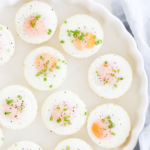Muffin Pan Eggs
Wholesome, versatile and easy to make, this easy method for baking eggs is sure to be a family favorite!
Prep Time5 minutes mins
Cook Time15 minutes mins
Total Time20 minutes mins
Course: Breakfast, Brunch
Cuisine: American
Servings: 12
Author: Julie Blanner
Ingredients
- 12 large eggs
Instructions
- Preheat oven to 375℉. Grease ramekins or muffin tins.
- Crack an egg into each well of a muffin tin. If you're using ramekins, place 2 into each ramekin and then place them on a sheet pan to bake.
- Bake 10-15 minutes (see details in notes below). Gently use a knife around the rim to remove.
Notes
Add fresh cracks of pepper and sea salt before serving. Garnish with chives or any fresh herbs for a beautiful presentation!
When baking at 375℉:
- 10 minutes: runny yolk
- 12 minutes: over-medium
- 14 minutes: fully cooked yolk
Storage Notes
Pack in a container with a fitted lid, and you can keep leftover baked eggs in the fridge to use within 3-4 days. You can also store your muffin tin baked eggs for up to three months, making them perfect for meal prepping and planning.How to Defrost from Frozen
Thawing in the Refrigerator
Place the frozen baked eggs in the refrigerator (either defrost them all at once, or freeze them in a container that allows you to defrost 1 or 2 at a time). Allow the eggs to thaw overnight in an airtight container for 8-12 hours. This method ensures even thawing and maintains the quality and safety of the eggs.Thawing in the Microwave
- Remove from Pan: Take the frozen eggs out of the freezer container or bag.
- Microwave-Safe Plate: Place the frozen eggs on a microwave-safe plate.
- Defrost Setting: Use the defrost temperature setting on your microwave. Start with 1-2 minutes, checking and flipping the eggs halfway through. Continue defrosting in short intervals until fully thawed.
Reheating After Thawing
- Oven: Preheat your oven to 350°F (175°C). Place the thawed baked eggs on a baking sheet and heat for about 10-15 minutes, or until warmed through.
- Microwave: Place the thawed eggs on a microwave-safe plate and heat on high for 30-60 seconds or until warmed through.
Nutrition
Calories: 63kcal | Carbohydrates: 0.3g | Protein: 6g | Fat: 4g | Saturated Fat: 1g | Polyunsaturated Fat: 1g | Monounsaturated Fat: 2g | Trans Fat: 0.02g | Cholesterol: 164mg | Sodium: 62mg | Potassium: 61mg | Sugar: 0.2g | Vitamin A: 238IU | Calcium: 25mg | Iron: 1mg
